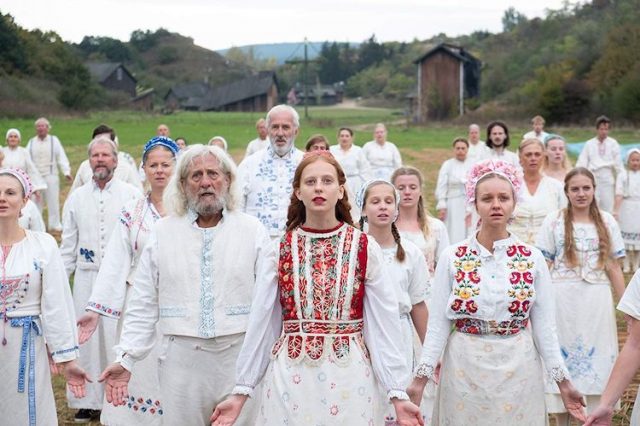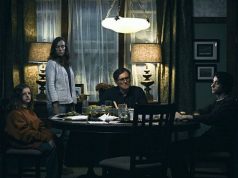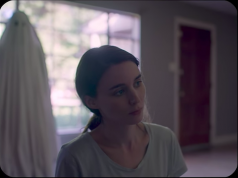
If books could always be accurately judged by their covers, the bespectacled, unassuming Ari Aster would be an accountant or an I.T. guy, not the fever-brained lunatic behind the deeply unsettling horror movie “Hereditary” — my favorite film of 2018 — and its followup, “Midsommar,” a sunlit pagan nightmare that is (deliberately) less scary but almost as disturbing.
It also conveys a message I have been touting for years, which is that Sweden is an enemy state that should not be trusted.
Like Aster’s previous film, this one begins with a family tragedy that proves to be maybe the eighth or ninth most terrible thing that happens in the movie. The survivor of this sad event, a college student named Dani (Florence Pugh), is overwhelmed with grief but finds little solace in her boyfriend, Christian (Jack Reynor), for whom the timing is most unfortunate because he was thinking about breaking up with her but can’t now.
To make matters worse — from Christian’s perspective, anyway, which Aster sneakily keeps showing us even though this is Dani’s story — Dani accidentally learns that Christian and his grad-school buddies are planning a trip to Sweden for a midsummer festival and had no intention of inviting her. Caught in a Seinfeldian dilemma, Christian backpedals and asks her to join them, telling her that his friends all want her to come, too. The friends — serious student Josh (William Jackson Harper), doing his thesis; horny jerk Mark (Will Poulter); and Pelle (Vilhelm Blomgren), who’s from Sweden and is taking his college friends home to see his local customs — reluctantly go along with the ruse.
Except for that devastating family tragedy, this all sounds like the setup for a comedy. There are moments of awkward relationship-based humor, plus a very funny sequence of the group tripping on mushrooms, but no, obviously Aster has something else in mind when our five travelers arrive at the idyllic meadows of rural Sweden where Pelle’s fellow villagers, clad in simple white tunics with colorful embroidery, have gathered for the nine-day festivities, delighted to have visitors.
The traditions in this village, as you may have surmised, are the kind that tend to raise eyebrows when outsiders learn of them (which they seldom do). The guys, who are anthropology students of some kind, seem to have been given a heads-up, but Dani wasn’t, and she is not in a state to cope with it. The festival’s other visitors (Ellora Torchia and Archie Madekwe), a young couple from London also brought in by a local, are likewise shocked.
Whether due to my own male bias, Aster’s framing of the story, or a combination of those things, I initially had the impression that Dani and Christian were seeing each other casually, maybe not even exclusively, and that she was a little clingy. I felt bad for her loss, of course, but I also felt bemused sympathy for Christian at being required to stay in the relationship longer than he intended.
But in Sweden we learn that they’ve been dating for four years. Christian isn’t some fling who’s suddenly called upon to act like a partner: He is a partner. Dani needs sympathy and compassion, doesn’t get it from him — and instead finds it in the Swedes’ outré customs, which emphasize empathy and shared experiences.
Aster fills the movie with vivid details, not all of which factor in to the story but add color to it. The village has an oracle who, by tradition, must be a deformed product of incest. The festivities include a dance-off around a maypole. Local girls show interest in some of the visiting men, and the visiting men do not always comport themselves with dignity. When one of them pees on what turns out to be a sacred tree, well, you can guess we’re headed for a “Wicker Man”/Shirley Jackson’s “The Lottery” situation (to name just two folk-horror influences).
But I suspect you will not guess exactly what’s to come, and you’ll get nothing from me other than a series of adjectives: ghastly, traumatic, unforgettable, vicious, etc. The madness on display is even more alarming when you realize the logic behind it, and by the end it’s a frenzy of extremely heightened emotions, most of them (but not all!) very negative.
Jack Reynor, who looks like a handsome version of Seth Rogen — like, if Seth Rogen were a movie star, he’d look like Jack Reynor — is a good fit as Christian, a guy who has failed in his present responsibilities but isn’t a bad person generally. He has the hangdog look of someone who knows people like him but are often disappointed in him. Florence Pugh, recently seen as a wrestler in “Fighting with My Family,” exhibits a different kind of strength here, drawing on a seemingly limitless reservoir of emotion to play a character in extremis. What happens in “Midsommar” isn’t as fundamentally upsetting (to me) as what happened in “Hereditary,” and its 140-minute runtime is more than it needs, but it’s stark and memorable in a way that few horror films are.
B (2 hrs., 20 min.; )





